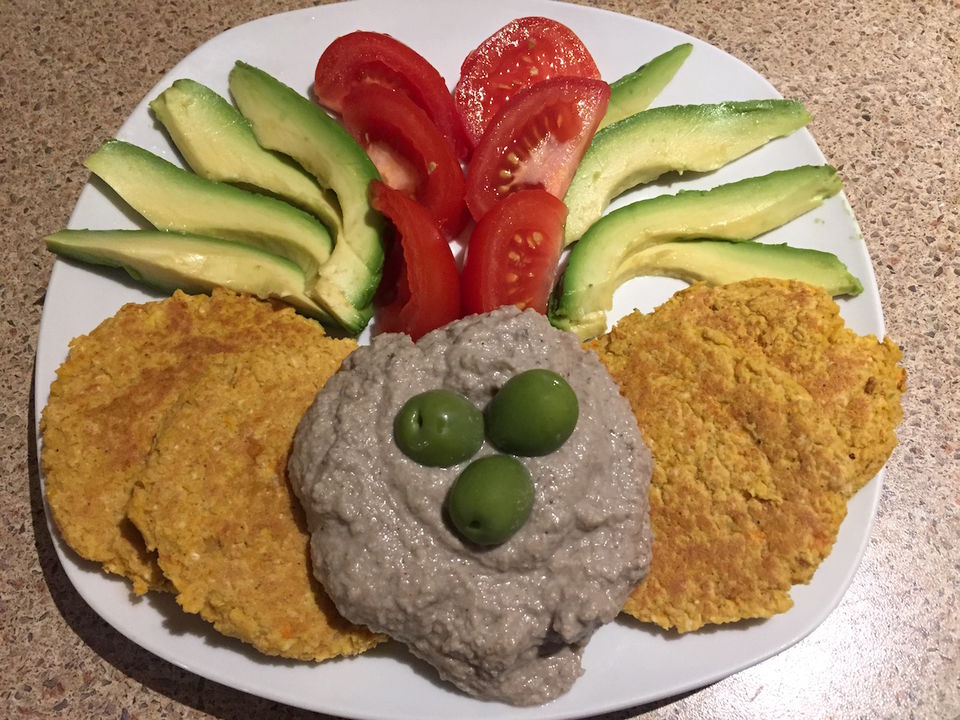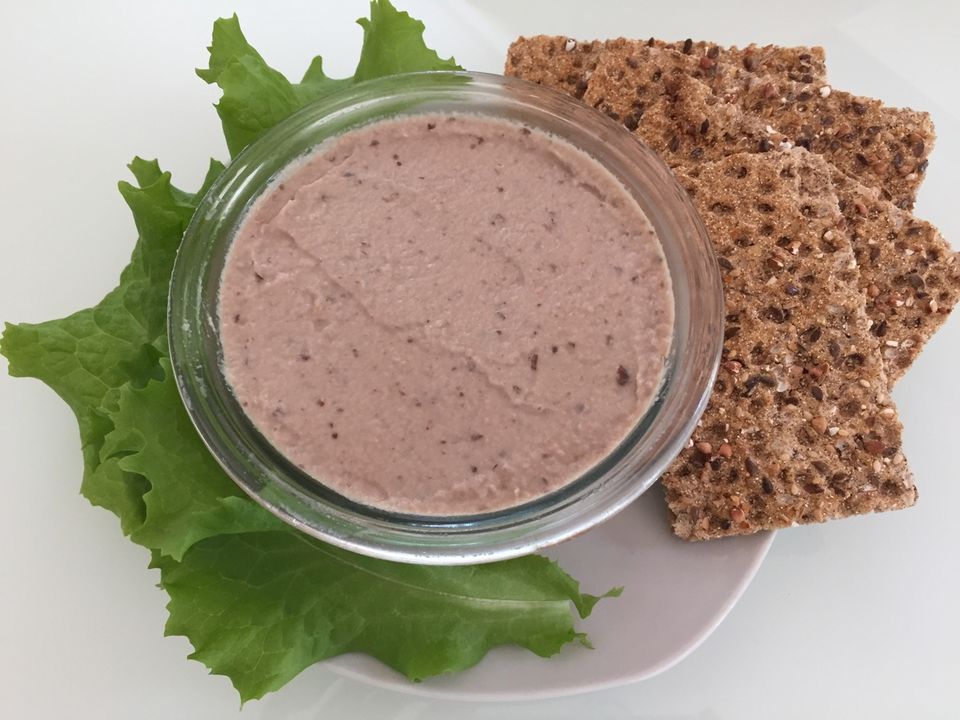Baba ganoush is a traditional Middle Eastern (Levantine) dish that is often used as a dip, spread, appetizer, or side to a meal. There are many versions and variations of it depending on the particular region and its culinary customs. The following recipe provides a modified version of a baba ganoush that is oil-free and does not use high-heat cooked eggplant, such as roasted or baked eggplant. It incorporates healthy and wholesome plant ingredients that provide healthy carbohydrates, protein, and fats, as well as fiber, vitamins, minerals, antioxidants, and phytonutrients. It is rich and creamy, and its versatility makes it easy to use as part of a meal or snack for adults and children alike.
Characteristics
TYPE: dip, spread, side
PREP TIME: < 20 mins
SERVINGS: makes roughly 2 cups (depends on size of eggplant)
- 100% Plant-based (Vegan)
- Wheat-free
- Gluten-free
- Grain-free
- Corn-free
- Soy-free
- Peanut-free
- Nut-free
- Oil-free
- Refined Sugar-free
Goodies Needed*
INGREDIENTS:
- 1 Medium to Large Organic Eggplant (any variety)
- 1/2 or more Medium White Onion or 1-2 tsp or Organic Onion Powder
- 1 - 2 cloves Organic Garlic
- 1 - 2 Organic Lemons (for juice)
- ~ 4 TBSP Organic Raw Tahini
- ~ 1/2 - 1 tsp Organic Cumin Powder
- ~ 1/2 - 1 tsp Organic Black Pepper
- ~ 1/2 - 1 tsp Unrefined Sea Salt
Optional*:
TOOLS:
- Stove
- Large Stainless Steel Skillet Pan with Lid
- High-powered blender, like a Vitamix
- Cutting Board
- Stainless Steel Utensils
- Silicone spatula
Preparation Steps
- Place about a 1-inch layer of water in your pan, and begin to heat on low heat with the lid on.
- Wash the eggplant, trim both ends, then cut the eggplant into discs or wedges.
- Place the cut eggplant into the pan and cover back with the lid.
- Remove the outer skins of the onion and slice into discs. Place the onion on top of the eggplant in the pan, and cover back with the lid.
- Allow the eggplant and onion to cook for at least 10 minutes. Be sure to cook on low heat and check to make sure the pan does not run out of water or the eggplant will burn.
- After about 10 minutes check the eggplant texture by piercing it with a fork. It should be very soft and uniformly darker in color. Depending on your stove, it may be ready or it may need a few more minutes of cooking. If so, stir the eggplant around and make sure that there is still enough water to cover the base of the pan.
- When the eggplant is fully cooked, turn off the stove and transfer the eggplant and onion, along with the water in the pan into your blender.
- Add in the remainder of the ingredients into your blender. Use less lemon juice and smaller amounts of spices for a medium eggplant and bigger amounts for a large eggplant. Blend everything on high until smooth to your liking. Taste to see if any more spices or salt should be added.
- Using a silicone spatula, remove the contents of the eggplant dip from your blender into a holding/storage container or directly onto your meal plates. Enjoy alongside your favorite whole plant foods, like raw vegetable sticks, bean patties, cooked grains, or starchy vegetables, etc.
- The eggplant dip can be stored in a sealed container in the fridge for up to about 2 to 3 days, but it is best to consume it fresh. Such blended eggplant will normally gel and harden after a few hours, so stir to reconstitute it before serving leftovers.

Tips
- If you don’t have a high-powered blender, you try this in a regular blender or a food processor for a more textured consistency, or even just mash with a fork and stir everything by hand.
- You can peel the eggplant before cooking or remove the skin after; eggplant with and without the skin will make a slightly different color and flavor of the baba ganoush.
- You can make slightly different flavor variations by playing around with your fresh and dried spices.

Health and Nutrition Benefits
Eggplant
- provides healthy carbohydrates, fiber, protein, and is naturally low in fat
- provides lots of phytonutrients, antioxidants, and anti-inflammatory benefits
- provides vitamins, specifically most B vitamins, including folate
- provides minerals, especially copper, manganese, and potassium
- supports optimal health, weight, healing, and prevention
- supports healthy cardiovascular and nervous system health
- helps prevent heart disease, cancers, and diabetes type 2
Sesame Seeds / Tahini
- provide healthy fats, protein, some carbohydrates, and fiber
- provide phytonutrients, antioxidants, and anti-inflammatory benefits
- provide vitamins, especially vitamin A and most B vitamins, including folate
- provide minerals, especially calcium, phosphorus, potassium, magnesium, iron, zinc, copper, and selenium
- support optimal health, weight, healing, and prevention
- support healthy blood pressure, blood sugar, and cholesterol levels
- protect against cardiovascular disease, cancer, diabetes type 2, osteoporosis, and other diseases
Lemons
- provide alkalizing, cleansing, detoxifying, anti-inflammatory, and anti-microbial benefits
- provide lots of phytonutrients and antioxidants
- provide some vitamins and minerals, most specifically vitamin C
- support optimal health, weight, healing, and prevention
- support healthy blood pressure, blood sugar, cholesterol levels, and liver function
- protect against cardiovascular disease, cancer, diabetes, infections, and other diseases
Garlic
- provides anti-inflammatory, antibacterial, and antiviral properties
- provides lots of phytonutrients and antioxidants
- provides vitamins, especially vitamin C and some B vitamins
- provides minerals, especially manganese, selenium, calcium, phosphorus, and copper
- supports optimal health, weight, healing, and prevention
- supports the immune system and iron metabolism
- protects against cancer, cardiovascular disease, and diabetes type 2
- supports healthy blood pressure, blood sugar, and cholesterol levels
Cumin
- not a significant source of calories or macronutrients
- provides phytonutrients, antioxidants, anti-inflammatory, and antimicrobial benefits
- provides vitamins, including vitamin A, C, and some B vitamins
- provides minerals, especially potassium, calcium, phosphorus, magnesium, and iron
- supports optimal health, weight, healing, and prevention
- supports healthy blood pressure, blood sugar, and cholesterol levels
- protects against cardiovascular disease, cancer, diabetes type 2, infections, and other diseases
Black Pepper
- not a significant source of calories or macronutrients (carbs, fats, protein)
- provides phytonutrients and antioxidants
- provides anti-inflammatory, antibacterial, and antiviral properties
- provides vitamins, including vitamin A, C, and K
- provides minerals, including potassium, calcium, magnesium, phosphorus, and iron
- supports optimal health, weight, healing, and prevention
- supports digestive health; helps prevent bloating and gas
- supports healthy blood pressure, blood sugar, and cholesterol levels
- protects against cardiovascular disease, cancer, diabetes type 2, and other diseases
Unrefined Salt
- unrefined sea salt unrefined Himalayan salt
- naturally alkalizing
- a source of over 80 essential and trace minerals
- supports optimal blood pressure, heart and nervous system health
- supports optimal health, weight, healing, and prevention
- Health Tip: avoid all forms of refined, white salt and processed foods made with it
(*) Include affiliate links to Amazon. As an Amazon Associate, I earn a small percentage from qualifying purchases and it does not cost you anything extra.
